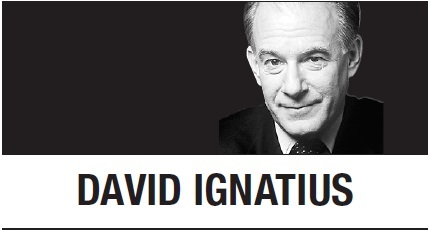As President Trump prepares to head to Asia next month for his most important overseas trip yet, foreign intelligence services are undoubtedly trying to assemble personality profiles to explain this unconventional, risk-taking, domineering president to the leaders he will meet.
How will they describe Trump? Probably not with the same hyperbole we sometimes use in our daily news commentary. Foreign governments aren’t as easily shocked or offended as journalists. They‘re used to bullying autocrats. They watch Trump’s nonstop circus act, probably with frequent dismay, but they must make policy decisions rather than value judgments.
Trump has been president for nine months now. If foreign analysts have been doing their reporting, they should discern some basic parameters of his presidency. They‘re not Americans; they don’t have to evaluate Trump‘s fitness to be president, or whether he has violated the constitution. They must deal with the reality that he was elected, that he probably has more than three more years left in office, and that foreign governments misread him at their peril.
What should well-informed foreign analysts say in their assessments of Trump? Here are some notes to get them started:
-- Trump likes creating chaos. It’s not an accident, or a problem of poor staff work, or an itchy Twitter finger. The man likes disruption and the occasional humiliation of others. He thinks it puts adversaries off balance and opens space for negotiation. An example is a piece that appeared last Friday by The Washington Post‘s Dan Balz, headlined “Trump governs by disruption -- and overloads all the circuits.” It discussed Trump’s “destructive” actions in decertifying the Iran nuclear deal and defunding Obamacare.
Not exactly a positive article, by the usual standards. But an insider says the White House loved it. That‘s the image Trump wants to present. His bullying tweets are what Secretary of State Rex “Fully Intact” Tillerson called “action-forcing events” on CBS’ “Face the Nation.”
-- Trump has high tolerance for risk, especially when operating with partners. That extends to the risk of nuclear conflict. Trump believes that, as one insider puts it, “If you want to win, you have to be prepared to lose.” Trump hears the angst about his brinkmanship, but he‘s happy for the leverage it gives him. When people worry he’s too near the edge of the cliff, he thinks this is fear talking -- since you never know how close you really are.
Trump has a different calculus about nuclear weapons than any recent president. He thinks that past presidents have been so scared about the danger of nuclear war that, as one insider puts it, “people play their hands into unwinnable positions.” Trump‘s propensity for risk is presumably checked by three generals who advise him and who know the face of war: But it’s Trump‘s finger that’s on the button.
Trump doesn‘t always go for broke. After his bankruptcies, he mostly franchised his name rather than putting his own money on the line. Golf explains Trump, too. With a difficult lie, does he try to bend the ball around a tree? Or does he play it safe and lay up? Sen. Lindsey Graham, R-S.C., a recent golf partner, tells me it depends. If Trump is playing one-on-one, he’s fairly careful, letting his competitors make mistakes and beat themselves. But if it‘s match play, when Trump has a partner and can afford a bad shot, he goes for it. Cautionary note to China: In the North Korea crisis, Trump thinks he’s in match play.
-- For Trump, everything is personal. He‘s a vain man who loves to be flattered. Early stroking pays dividends. His best relationships are probably with the Saudis, the Chinese and the Japanese. All three relationships have featured personal visits, a show of rapport -- and were set up early by Jared Kushner, who is still the custodian of Trump’s personal account in foreign policy.
The China relationship is especially important for Trump. He campaigned on a tough anti-Beijing line, but he has come to see President Xi Jinping as a kindred spirit: a fellow “big guy,” a populist autocrat, a risk taker who keeps confounding his rivals.
The bottom line is that Trump hungers for success and wants the credit for it. His Asian hosts are thinking now how to deliver goodies on trade -- measures that Trump can tout as reducing the trade deficit and opening market access.
As an American, I find Trump‘s approach to the presidency divisive and potentially dangerous. But that’s not what foreign governments worry about. They seek to understand Trump and bend him toward their interests.
By David IgnatiusDavid Ignatius‘ email address is davidignatius@washpost.com.-Ed.
(Washington Post Writers Group)






![[KH Explains] Hyundai's full hybrid edge to pay off amid slow transition to pure EVs](http://res.heraldm.com/phpwas/restmb_idxmake.php?idx=645&simg=/content/image/2024/04/18/20240418050645_0.jpg&u=20240419100350)